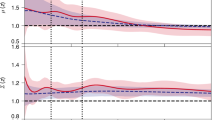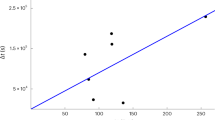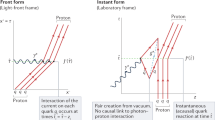Abstract
I previously argued that the origin of time asymmetry is to be sought in the processes that characterized the very early cosmological epochs, and that the recent inflationary scenario provides a crucial element in our understanding of this origin1. Here, I develop this thesis further, in the light of criticisms by Page2. I argue in particular that any of the “initial states” that appear to be permitted by quantum gravity, if succeeded by a period of inflation, would have wound up the universe to the state from which, as indicated by increasing entropy, it is now winding down.
This is a preview of subscription content, access via your institution
Access options
Subscribe to this journal
Receive 51 print issues and online access
$199.00 per year
only $3.90 per issue
Buy this article
- Purchase on Springer Link
- Instant access to full article PDF
Prices may be subject to local taxes which are calculated during checkout
Similar content being viewed by others
References
Davies, P. C. W. Nature 301, 398–400 (1983).
Page, D. N. Nature 304, 39 (1983); Int. J. theor. Phys. 23, 1–8 (1984).
Davies, P. C. W. The Physics of Time Asymmetry (Surrey University Press 1974); The Runaway Universe (Dent, London, 1978).
Boltzmann, L. Lectures on Gas Theory, 1896–1898 (English translation by S. G. Bush; University of California Press, 1964).
R., Penrose in General Relativity: an Einstein Centenary Survey (eds Hawking, S. W. & Israel, W.) (Cambridge University Press, 1979).
Guth, A. H. Phys. Rev. D23, 347–356 (1981).
Gibbons, G. W., Hawking, S. W. & Siklos, S. T. C. (eds) The Very Early Universe 205–266, 287–310 (Cambridge University Press, 1983).
W., Boucher & G. W., Gibbons in The Very Early Universe (eds Gibbons, G. W., Hawking, S. W. & Siklos, S. T. C.) 273–278 (Cambridge University Press, 1983).
Reichenbach, H. The Direction of Time (University of California Press, 1956).
G. W., Gibbons & Hawking, S. W. Phys. Rev. D15, 2752 (1977).
Barrow, J. D. & Turner, M. Nature 298, 801–805 (1984).
Linde, A. D. in The Very Early Universe (eds Gibbons, G. W., Hawking, S. W. & Siklos, S. T. C.) 205–250 (Cambridge University Press, 1983).
Vilenkin, A. Phys. Lett. 117B, 25–29 (1982).
Moss, I. G. & Wright, W. A. Preprint, Univ. Newcastle (1984).
Hawking, S. W. in Astrophysical Cosmology: Proceedings of the Study Week on Cosmology and Fundamental Physics (eds Bruck, H. A., Coyne, G. V. & Longair, M. S. (Pontifica Academia Scientiarum, Vatican 1982).
Hartle, J. B. & Hawking, S. W. Phys. Rev. D 28, 2980–2075 (1983).
Hawking, S. W. & Luttrell, J. C., Preprint, Univ. Cambridge (1984).
Hawking, S. W. Phys. Rev. D 14, 2460–2473 (1976).
Author information
Authors and Affiliations
Rights and permissions
About this article
Cite this article
Davies, P. Inflation in the universe and time asymmetry. Nature 312, 524–527 (1984). https://doi.org/10.1038/312524a0
Received:
Accepted:
Issue Date:
DOI: https://doi.org/10.1038/312524a0
This article is cited by
-
Cosmological dissipative structure
International Journal of Theoretical Physics (1989)
Comments
By submitting a comment you agree to abide by our Terms and Community Guidelines. If you find something abusive or that does not comply with our terms or guidelines please flag it as inappropriate.



